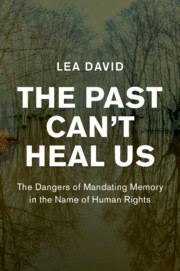Book contents
- The Past Can’t Heal Us
- Human Rights in History
- The Past Can’t Heal Us
- Copyright page
- Contents
- Acknowledgements
- Abbreviations
- 1 Introduction
- 2 Human Rights As an Ideology?
- 3 What Is Moral Remembrance?
- 4 The Institutionalisation of Moral Remembrance
- 5 The Institutionalisation of Moral Remembrance
- 6 Human Rights, Memory and Micro-Solidarity
- 7 Mandating Memory, Mandating Conflicts
- Bibliography
- Index
7 - Mandating Memory, Mandating Conflicts
Published online by Cambridge University Press: 26 June 2020
- The Past Can’t Heal Us
- Human Rights in History
- The Past Can’t Heal Us
- Copyright page
- Contents
- Acknowledgements
- Abbreviations
- 1 Introduction
- 2 Human Rights As an Ideology?
- 3 What Is Moral Remembrance?
- 4 The Institutionalisation of Moral Remembrance
- 5 The Institutionalisation of Moral Remembrance
- 6 Human Rights, Memory and Micro-Solidarity
- 7 Mandating Memory, Mandating Conflicts
- Bibliography
- Index
Summary
The last chapter engages in a more speculative debate to ponder the significance and possible dangers of this new global human rights memorialisation regime. Three questions are asked that define the impact that moral remembrance has on the ground. The first question deals with the tension between moral remembrance, promoted through the morality of human rights, and the nation-state–sponsored memorialisation agenda. The second question deals with the under-researched and neglected impact that the human rights memorialisation agenda generates on the ground – namely, the production of new social inequalities. Here, the tension between moral remembrance as an ideal and the political interests of various groups, organizations and opposing agendas results in trade-offs and struggles over scarce resources, which lead to new social inequalities and the marginalisation of many who cannot afford to participate in those transactions. Finally, the chapter asks whether moral remembrance has the potential to transform individuals in local communities into believers in human rights values and motivate them to engage in moral action based on those values. I argue that in real-life settings, mandating memory in the name of human rights has been frequently counterproductive and has produced a series of undesired and damaging outcomes on the ground.
Keywords
- Type
- Chapter
- Information
- The Past Can't Heal UsThe Dangers of Mandating Memory in the Name of Human Rights, pp. 186 - 213Publisher: Cambridge University PressPrint publication year: 2020



